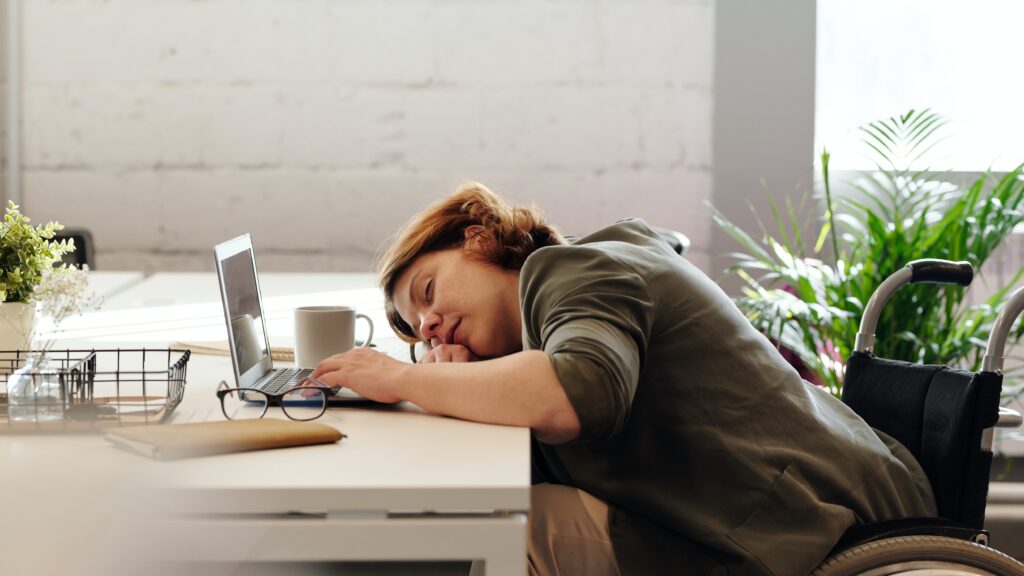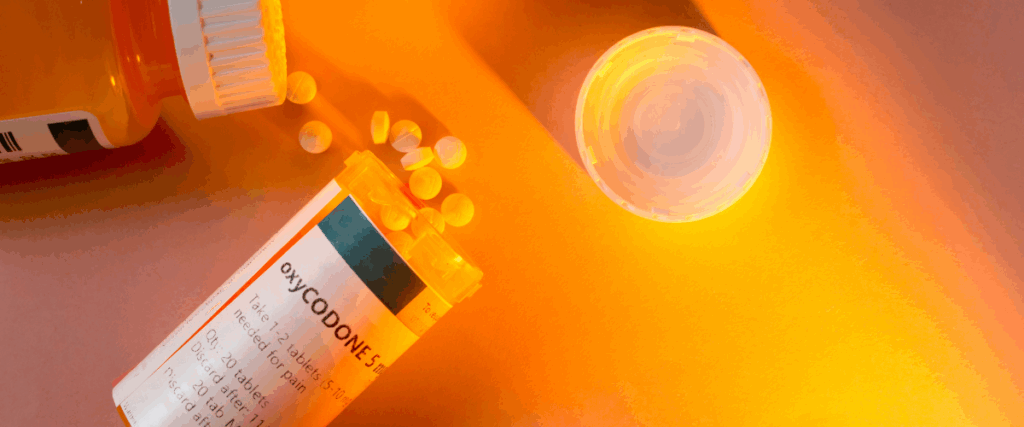If you’re taking opiates, it’s essential to be aware that they have significant potential for creating opiate addiction.
Opiate drugs are medications that are derived from the opium poppy plant. Described as sedative narcotics, they depress the activity of the central nervous system and reduce pain.
In this article, we’ll explore the signs of addiction and provide tips for safe medication use.
If you’re concerned that you may have developed an opiate addiction, we’ll also share information about recovery support and offer advice on what steps to take next.
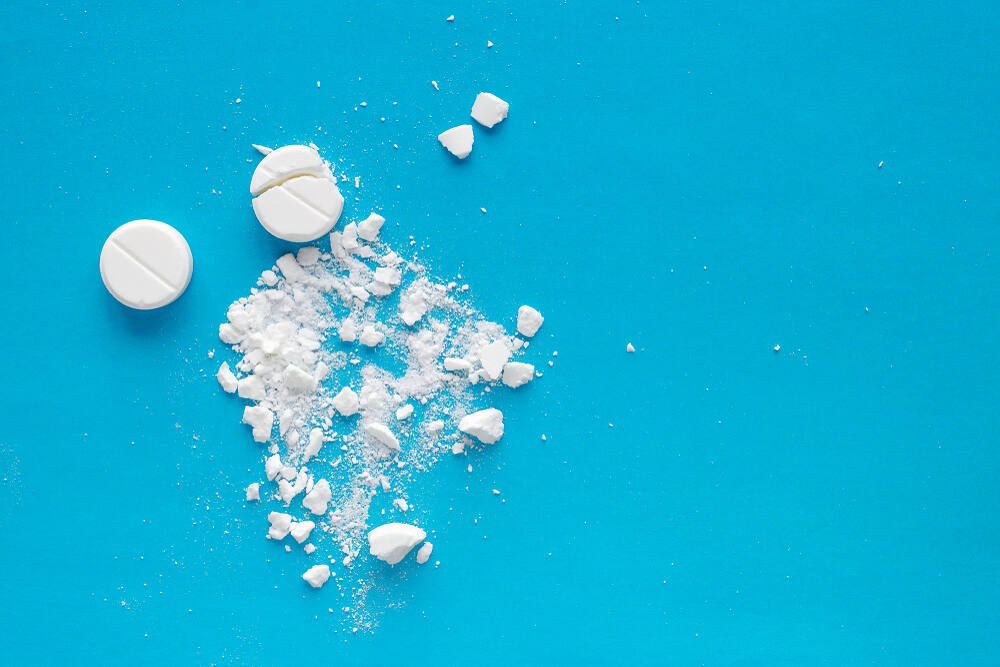
What are Opiates?
Opium plants have been grown for medicinal and recreational purposes since prehistoric times. Scientists have traced its earliest use back to 1500 BC.

Opiate pain-relieving and euphoric effects were quickly realised, but there was little information about the possible dangers of abusing such a powerful narcotic in those days.
Opiates block pain by binding to the brain’s pain receptors and changing how the brain interprets pain. Although a very effective analgesic, opiates do not cure any ailments. The euphoria this class of drug produces can send a person into an altered state of consciousness.
Painkilling opiates are legally available today on prescription in stronger strengths and over-the-counter in weaker doses; both hold the potential to be abused, and both can cause dependence and addiction.
Opiates come in numerous forms and are regularly combined with other analgesics to provide more effective pain relief. Opiates can be pure, synthesised or semi-synthesised. All are equally addictive, and all produce opiate withdrawal symptoms if you have a physical dependence.
Opiates in all their forms, whether prescription, illicit or over-the-counter painkillers, are being abused worldwide. Death rates around the world have risen alarmingly over the past ten years, declaring a worldwide opioid crisis.
Opiate addiction in the UK
Prescription opioid painkiller abuse and illicit opiate use have seen a rising trend in the number of deaths resulting from this class of drugs.
Due to what some may say is uncareful prescribing of opiate pain relief medications and increased availability on the darknet, prescription pill addiction has risen tremendously. This has resulted in more deaths being recorded every year than ever before.
Abuse of any opiate is extremely dangerous. It is important that if you or a loved one has a problem with opiate abuse or opiate addiction, you seek medical and addiction help without further delay.
Opiate Abuse and Overdose Statistics For England and Wales
The UK is currently facing an opioid crisis; stronger and purer drugs are available on the streets and the black market. Over the last decade, there has been a marked increase in illicit opiate purity.
Heroin, a Class A illicit opiate, is now often contaminated with other drugs to make it more potent, including Fentanyl and Carfentanyl. These two potent opiate drugs have been responsible for a substantial rise in overdose deaths relating to IV Heroin users.
In 2020, there were 2,263 opiate-related deaths in England and Wales. A staggering number of deaths could have been prevented if the correct opiate treatment had been accessed in time.
The Darknet Role In Rising Opiate Abuse
Over recent years, there has been more availability of prescription opiate painkillers that can be purchased online without a prescription. This has contributed considerably to the rise in prescription opiate drug abuse.
Worldwide, in 2019, about 600,000 deaths were attributable to drug usage. Close to 80% of these deaths are associated with opioids, with about 25% of those deaths caused by opioid overdose.
Opioid vs Opiate
An opioid is a term that was initially used to differentiate synthetic opiates from pure opiates. Opioids were applied to semi-synthetic and synthetic drugs of the opiate class of medicines. Now, the terms opiates and opioids are used interchangeably to describe any opiate-based drug or medication synthesised to mimic its effects.
Examples of opioids include Fentanyl, Methadone, Tramadol and Oxycontin. Examples of opiates include Heroin and Morphine.
Essentially, opiates and opioids are the same; some are pure, some are synthesised and some are semi-synthesised. There is a vast variety of opiate-based drugs available.
Synthetic and semi-synthetic opioids were initially developed as they were thought to be less addictive and have less abuse potential than pure opiate-based drugs. However, this theory has since been disapproved. Synthetic and semi-synthetic opiates can be harder to withdraw from where a dependence has developed as chemically, they are more complex in their structure.

List of Opiate & Opioid Medications
| Oramorph | Buprenorphine | Hydromorphone | Co-codamol | Clonidine |
| Oxycodone | Morphine | Methadone | Nurofen plus | Fentanyl |
| Tramadol | Oxycontin | Hydrocodone/Vicodin | Codeine | Heroin |
| Roxicodone | Carfentanil | Solpadeine Max | Hydrocodone | Percocet |
The dangers of Opioids
The main dangers are associated with abuse, dependence, addiction and overdose. Anyone who is using or abusing regularly is susceptible to developing dependence and addiction. They are also putting their lives at significant risk.
When opioids are abused or mixed with other drugs, there is a sizeable risk of overdose. Most individuals unintentionally overdose by not understanding the dangers of mixing opioids with alcohol or other drugs.
The dangers are genuine. Recent years have seen heroin, morphine, and fentanyl-related deaths hit a record high in England and Wales, with the North East of England being the worst affected.
Opioid Addiction
If you are using or abusing either on prescription, over the counter or illicitly – please, please ensure that you are fully aware of the dangers associated with this powerful class of depressant drug.
Opioid addiction is created through repeated exposure. When the medication is frequently used or abused, the brain’s chemistry and structure change over time; these changes cause the individual to seek and take them compulsively.
Once opioid addiction has occurred, the individual will find it exceptionally difficult to stop opiates and stay drug-free without professional intervention. Even then, staying clean can become a daily battle.
Addiction is a progressive illness that only gets worse over time without the correct treatment. By the time the individual reaches a crisis point and asks for help, typically, they will have lost a great deal in terms of their addiction.
Opioid addiction has been proven to change and restructure the brain. Once manifested, it isn’t easy to reverse. Removing the drug through medical drug detox is not enough, as the brain will remain in the same altered state. An opiate-addicted brain compels the individual to seek and take medications as a baseline solution to problems and feelings.
Recovery from opioid addiction can be tough to maintain. However, it IS possible to stay free of opioids if the individual is prepared to put the work in to help rehabilitate themselves with the assistance of professional treatment.
Successful addiction treatment requires psychological and cognitive behavioural therapies to assist in changing the individual’s mindset and provide them with strategies and coping mechanisms to maintain abstinence and prevent relapse.
Abuse of Opioid Medications

Many who abuse prescription opioids may well start with a prescription for a genuine complaint such as post-operative pain, a broken bone or a back problem. The problem with opioids is that they cause tolerance and dependence to build very quickly, within 2 to 10 days of continuous use.
You may be tempted to manipulate your doctor for a repeat prescription long after the complaint has been resolved, as you fear going through withdrawal.
If you use prescribed opioids for prolonged periods, you will likely build a tolerance to their effects and a physical dependence on them. This means that the dosage prescribed will lose its analgesic effectiveness, and you may start to suffer from withdrawal symptoms.
If dependence occurs, you may well be tempted to increase the dosage yourself. You must seek your doctor’s advice if this is your experience. Not adhering to a prescription is how most addictions commence.
Other forms of prescription opioid abuse involve purchasing opiate drugs from the black market; this may be from the darknet or a street dealer. Many individuals also access opioids from friends or family members who have prescriptions. You may well see this as harmless and a case of needs must, but there is an excellent reason for not taking a prescription medication that does not belong to you, even if you are in genuine pain.
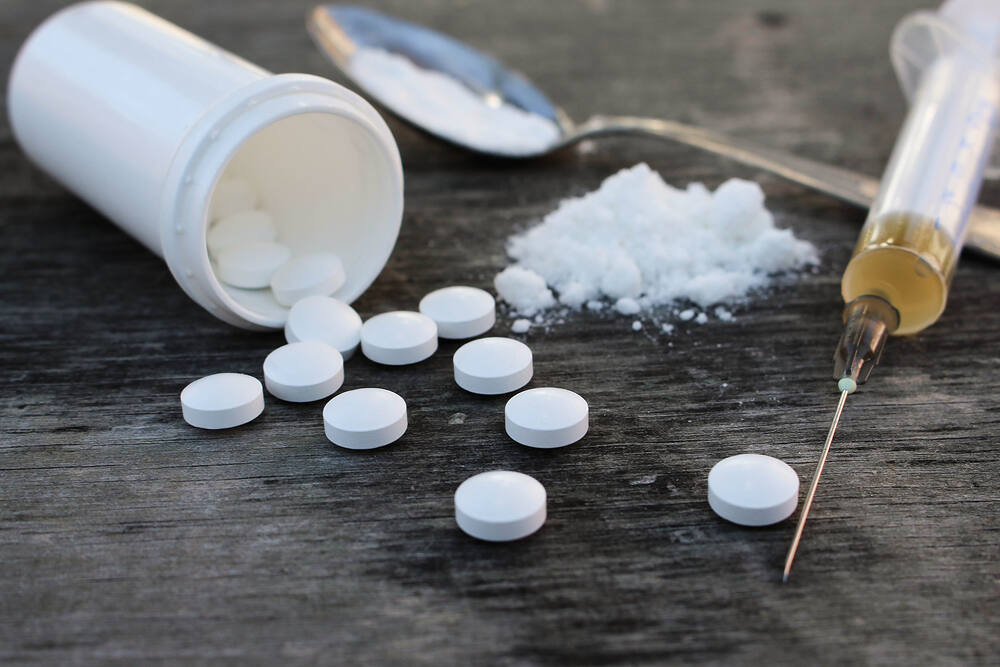
Another common form of prescription opioid abuse is to seek and take prescription-strength opioids purely for their euphoric and calming effects. This has nothing to do with using them for the purpose intended, which is pain relief.
Abusing prescription opioids purely for a euphoric high carries added risks. Individuals are more prone to be reckless, take more risks and mix them with other substances.
If you or a loved one are abusing prescription opioids in any form, you must seek professional help without delay. Prescription opioid withdrawal doesn’t need to be painful, and drug rehabs can offer medical detoxes. Please call Detox Plus UK for information on private detox.
The Link Between Dopamine and Opioid Addiction
Dopamine and how it is controlled are heavily linked to the creation of addiction. Opioids induce euphoria and block pain by binding to the brain’s pain receptors and releasing dopamine into the brain in abundance.
Dopamine is a naturally occurring chemical that acts as a messenger between brain cells. Dopamine plays a vital role in many of our daily behaviours. It affects how we move, how we eat, our motivation levels, our emotions, how we learn and whether we become addicted to drugs.
Dopamine is released as a reward and is a feel-good chemical. Drugs such as heroin, opioids, cocaine, alcohol and even sugar cause huge (but temporary) spikes in the levels of dopamine available in the brain. This spike is responsible for the euphoric high received in drug-taking. It is the reward from the dopamine spike that prompts drug addicts to seek out and take drugs again and again, even when there are negative consequences at stake.
Repeated use and abuse of opioids alter the brain’s reward system. Eventually, at the peak of drug addiction, the brain stops producing its dopamine naturally. The only way an addicted individual can feel any pleasure at all is to seek and take the drug that the brain responds to.
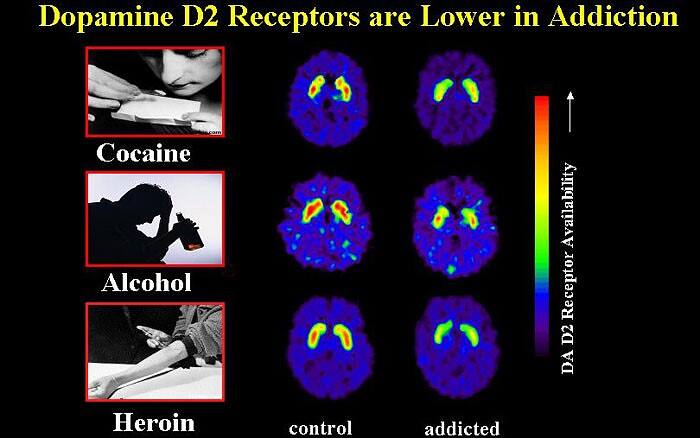
This explains why drug addicts continue to take drugs even when they are greatly suffering as a result.
For recovery from addiction to occur, the addicted brain must abstain from opioids, be allowed time to heal and be retrained to seek healthier ways of stimulating the reward system.
The Difference Between Opioid Tolerance, Dependence, and Addiction
Opioid tolerance occurs once the brain has adjusted to function on a specific medication dosage. The drug, as a result, loses its euphoric and analgesic effects. The individual will need to take more of the drug to gain the original desired effect or swap to a more potent form of opiate. Tolerance develops over time and with frequent use.
Opioid dependence is where an individual requires a specific dosage of a drug to stave off opioid withdrawal symptoms. This regularly occurs once a tolerance has developed.
Someone can be physically dependent and tolerant of an opiate drug without being addicted. This is common in long-term pain management. As they are not abusing the opiates for their euphoric effects, the drug works as it should – as an effective analgesic. They may require a medical detox, but once the detox is complete, they will no longer obsess or crave the drug, unlike a person with an addiction would.
Opioid addiction is what kills most individuals who suffer drug poisoning-related deaths. People with an addiction will go to extreme lengths to ensure their addiction is satisfied.
Not only does an addicted individual usually suffer from dependence and tolerance through repeated use, but they also suffer from a mental craving and obsession for the drug rewards that are beyond their control.
The compulsive and obsessive aspect of addiction is what kills so many. They become powerless to stop and stay stopped and will usually chase the drug to the gates of institutions, prisons, insanity or death.
If you have an addiction to opioids, you must get help without delay. Most addicts swear that they will “Use this one last time before quitting”. Sadly, for many, their addiction is too powerful to allow for this to happen.
Characteristics of Opiate Addiction
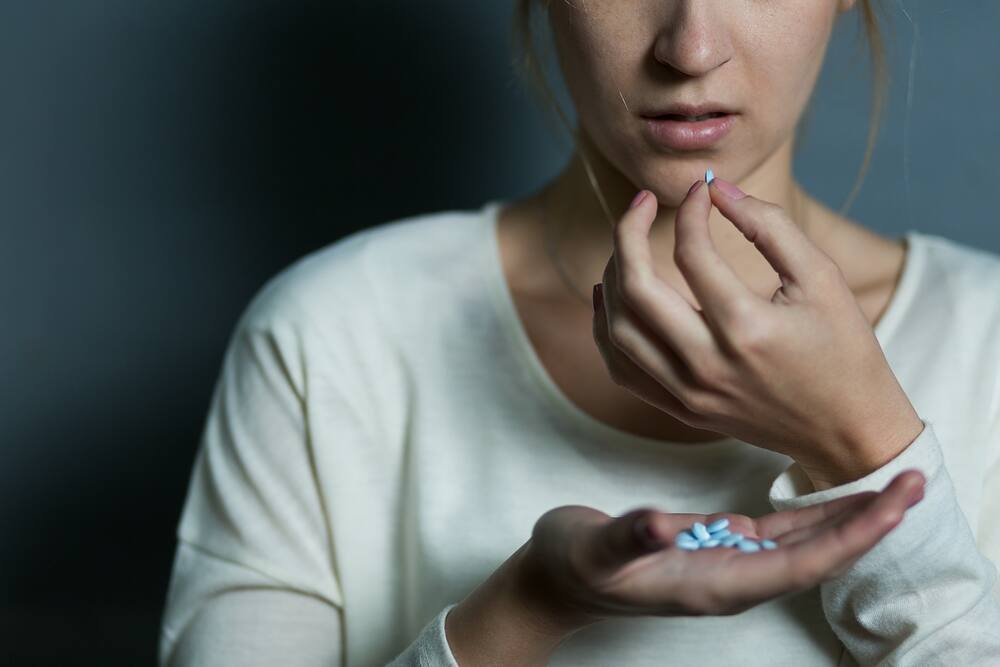
Specific characteristics will help you determine if you have an addiction. Characteristics of addiction include:
- Compulsively using opioids despite wanting to stop
- Obsessing over getting and taking opioids
- Being secretive, deceitful and lying about the number of opioids you take
- Withdrawing from family, friends, and loved ones to avoid being challenged
- Frequent intoxication from opioid abuse
- Breaking your moral code of conduct to get opioids.
- You have managed to stop previously, but keep relapsing on opioids
- You stockpile opioids as you are fearful of running out
- You have suffered negative consequences as a result of your drug-taking
- Someone close to you has expressed concern that you have a problem. The thought of living without opioids terrifies you
- Planning, getting and taking opioids take up much of your day
This list is not finite; many factors and behaviours are typical of addiction, but if you do identify with any, you certainly have a problem that warrants further investigation by an addiction specialist or medical professional.
What Causes Opioid Addiction?
Opioid addiction is both a mental and a biochemical illness. Opioid addiction is caused by a disease of the brain that develops and progresses over time with repeated exposure or abuse of opioids.
No one knows for sure why some opioid users develop an addiction and others just a dependence, but there is a definite difference between the two.
Addiction is a chronic, relapsing brain disease; once it has developed, there is no going back to recreational use or controlled use. Abstinence is the only suggested way of stopping the disease from further progressing.
Someone with an opioid addiction will suffer from both a physical craving and an overwhelming mental obsession and compulsion to take opioids. Even once the physical aspect of opioid addiction has been treated successfully with detoxification, the mental aspect will remain and often lead to relapse. This is why psychologically based, evidence-based addiction treatments are a critical part of drug rehabilitation.
Signs and symptoms of opioid addiction
The following are considered to be signs and symptoms that are typical of opioid addiction
- Frequent intoxication from opioids
- Seeking out the most potent drugs for the most profound high
- Using for the euphoric effects as opposed to analgesia
- Notable changes in appearance and behaviour
- Isolating and changing groups of friends
- Neglecting essential self-care, finances, personal responsibility and family
- Progressing from prescription to illicit drugs
- Progressing from smoking to injecting opioids
- Taking more and more opioids as time passes
- Finding paraphernalia, prescription bottles, blister packs, and tin foil around the house
- Dishonesty, manipulation, secrecy and denial
Risk Factors for Developing Opioid Addiction
Many risk factors can contribute to developing an opioid addiction, aside from the fact that it is a very addictive group of drugs. With addiction, certain calculated risk factors can make an individual more susceptible.
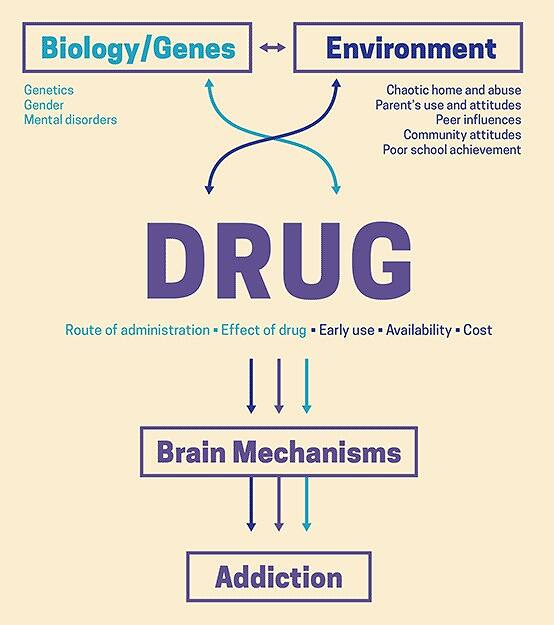
Biological makeup, genetics and environment play a part. Other risk factors are trauma, mental health illnesses, childhood bullying and neglect. Troubled children are especially at risk as their brains are still in the most critical growth period and very vulnerable to chemical influences.
Scientists estimate that genes, including the effects of environmental factors, have on a person’s gene expression, account for between 40 and 60% of a person’s risk of developing an addiction.
Many who suffer from the disease of addiction start experimenting with various drugs at a reasonably young age, typically between the ages of 11 and 15. This sets up a pattern for progression to other drugs, or they may find the right drug that does for them what they cannot do for themselves straight away.
Avoiding and Preventing Addiction to Opiate Drugs
Addiction can be avoided and prevented. If you are taking prescription medications and find yourself craving more and more as time goes on, remember you can stop the cycle at any point by asking for professional help.
Education plays an essential part in preventing addiction. It is wise to educate yourself and other family members on the associated risk factors and dangers before taking opiates. If you possess certain risk factors that could make you more vulnerable to developing an addiction, please consider a non-addictive alternative pain relief first and discuss your concerns with your doctor or pharmacist.
Exceptional caution around opiates should be exercised by those who have suffered previous mental health issues or addiction problems, including alcoholism.
Signs of Opiate Intoxication
The following are signs of opiate intoxication:
- Bradycardia (slowed pulse rate)
- Decreased perception of pain
- Low body temperature
- Hypokinesis (slowed body movement)
- Calmness
- Meiosis (pinprick) pupils
- Slowed, slurred and delayed speech
- Excessively drowsy
- Unsteady on feet / slumped when sitting
- Euphoria
- Confusion
- Nausea
- Sedation
Am I Addicted to Opiates?
If you are worried you may have an opiate addiction, ask yourself if you identify with the following characteristics of a person with an addiction:
1. a person with an addiction will often crave and use more than they originally intended
2. a person with an addiction will be preoccupied with thoughts of planning, getting and taking them
3. a person with an addiction will usually make attempts to stop, but will not be able to stay stopped without undergoing professional treatment
4. a person with an addiction will be highly fearful of running out of them
5. a person with a substance use disorder will be dishonest, manipulative, cheat or steal to access the drug
6. a person with a substance use disorder will likely suffer withdrawal symptoms if they are unable to get their usual dose or fix
If you identify with any of these common characteristics of a person with a substance use disorder, it strongly indicates that you have an addiction problem.

The Long-Term Effects Of Opiates On Your Body
Abusing opiates, whether prescribed painkillers or illicit heroin, can have severe consequences for your body and overall health.
Those who use illicit opiates, especially of the extreme variety, i.e. heroin or fentanyl and inject intravenously are at the most risk of overdose or causing irreparable damage to their body.
Other effects of opiates on the body caused by long-term use or abuse include:
- A weakened and compromised immune system
- Gastric problems include constipation, malnutrition through poor absorption and bowel perforation
- Significant respiratory depression and reduced oxygenation of the body’s vital organs
- A vast number of physical problems and illnesses are associated with intravenous administration (e.g. abscesses at injection sites, collapsed veins, DVT, contraction of bloodborne diseases, cellulitis, and puncture of an artery
Long-term use, abuse or addiction can also cause cognitive impairment and depression.
Opiate withdrawal: stages and symptoms
Opiate withdrawal should never be attempted without first consulting with a physician or addiction specialist. There is a chance that if you are addicted to high levels of strong opiates, your withdrawal symptoms could become life-threatening. This is especially true for those who have had a dependence for a substantial period.
Severe withdrawal symptoms or acute withdrawal can be dangerous. Symptoms such as imbalanced electrolytes, rapid heart rate and seizures can put your life at risk. It is for this reason that it is recommended that individuals who have a long-term or heavy addiction attend a drug rehab centre for medical opiate detox. This is clinically proven to be the safest way for a chronic opiate problem.
For further information on private drug rehab, please call and speak to one of our friendly and experienced drug treatment experts.
Early Stage Opiate Withdrawal Symptoms
Early-stage withdrawal symptoms typically occur between 4 and 24 hours from the last dose, depending on the type of drug and frequency of administration.
Early withdrawal symptoms include:
- Watery eyes
- Runny nose
- Excessive sweating
- Anxiety
- Agitation
- Irritability
- Cravings
- Muscle aches
- Abdominal cramps
The early symptoms tend to be mild to moderate in severity and give way to the later stages of opiate withdrawal.
Later Stage Opiate Withdrawal Symptoms
The later stage of withdrawal symptoms generally starts between 30 and 72 hours after the last dose of opiates. Again, this time frame can be affected by the strength, route of administration and type of opiate.
Later-stage withdrawal symptoms include:
- Diarrhoea
- Vomiting
- Increased heart rate and blood pressure
- Restlessness
- Muscle cramps and tightness
- Brain fog
- Headache
- Chills
- Goosebumps
- Shakiness
- Strong cravings
- Anxiety
- Panic
- Depression
- Dilated pupils
- Loss of appetite
- Lethargy
- Insomnia
- Yawning
- Sneezing
- Seizures (usually only in the most severe cases of withdrawal)
The later stage tends to last for anything between 4 and 21 days, depending on the type of opiate, route of administration, dosage, frequency and duration of dependence.
The final stage of withdrawal only tends to occur in those who have had a long-term chronic dependence or addiction. Symptoms can be protracted and go on for some time. In some cases of severe addiction, it can last for months and up to 1 year.
Protracted Opiate Withdrawal Symptoms
Protracted withdrawal symptoms, or PAWS for short, present symptoms that tend to come and go in waves. The waves of PAWS tend to become less frequent and diminish in their severity over time.
- Protracted withdrawal symptoms (PAWS) include:
- Depression
- Anxiety
- Insomnia
- Cravings
- Muscle aches and pains
- Lethargy
- Poor decision-making skills
It is essential for any individual experiencing PAWS symptoms to access addiction support to help them through this difficult time. Regularly accessing addiction support helps to reduce the chances of opiate relapse.
How Long Do Opiates Stay In Your System?
How long opiates stay in your system depends on several factors, including the following:
- The method of testing, i.e., urine test, blood test, saliva test or hair test
- The length of time the person has been using the drug regularly for
- The strength of the medication
- Whether it has been swallowed, injected or smoked
- Whether the medication is quick-release or slow-release
- The individual’s gender, BMI, metabolic rate, age, and organ efficiency
Because the above factors vary from person to person, it is impossible to give a definitive answer as to how long opiates stay in your system. However, some guidelines are issued to local drug and alcohol teams that can be considered.
Codeine: a urine test is used to detect the presence of Codeine in your system, 2 days.
Dihydrocodeine: A urine test is used to detect the presence of Dihydrocodeine in your system, 3 days after use.
Heroin: a urine test is used to detect the presence of heroin in your system, 2-3 days.
Methadone: a urine test is used to detect the presence of Methadone in your system, 3 days, or 7 to 9 days with a methadone maintenance programme or chronic user.
Morphine: a urine test is used to detect the presence of morphine in your system, 2 days.
As a guiding rule, opiate drugs can be detected in saliva for longer than in urine. Hair samples can pick up traces of opiates weeks to months after the opiates have been stopped in a chronic user.
Reducing Opiate Withdrawal Symptoms
Pharmaceutical medications are available to help reduce withdrawal symptoms. However, likely, you will only be able to access medications if you undergo a complete drug detox within a CQC-registered detox clinic or rehab centre.
The worst part of opiate withdrawal is the psychological symptoms, which include acute anxiety, strong cravings and paranoia. These psychological symptoms of withdrawal can amplify the physical withdrawal symptoms to a point where the individual seeks relief from more opiates.
Opiate withdrawal symptoms can be reduced in several ways, although dealing with full-blown withdrawal in the community will test most individuals’ resolve never to use it again.
If you are unable to access drug rehab for treatment, it is wise to discuss an opiate reduction regimen with a doctor before starting. Having someone with you while you detox can be very helpful, provided they are going to support you in your attempt to stop.
It is important to ensure that you stay well hydrated while detoxing to avoid electrolyte imbalances, which can become life-threatening if not medically treated. If you are unable to stomach food, speak to your doctor or pharmacist about which dietary supplements are best for you. Regular paracetamol and ibuprofen will assist with fever and muscle aches.
Your pharmacist or doctor will be able to make recommendations for dealing with stomach cramps and diarrhoea.
Community Opiate Detox
If you are undergoing a community detox, it is helpful to engage in community therapy or self-help groups such as Narcotics Anonymous or SMART Recovery. Your local drug and alcohol team will also be able to provide groups and keywork sessions. Moral support can go a long way in encouraging you through the worst of the psychological symptoms associated with withdrawal and help prevent relapse.
It is possible to undergo a community detox with the assistance of your doctor or local drug and alcohol team. Please enlist both to ensure you have as much support as possible before starting.
Private Drug Rehab – Medical Opiate Detox

If you can finance private drug rehab, a full medical opiate detox is recommended. This is clinically the safest way to detox, as you will be monitored throughout and provided with approved prescription medications to help reduce withdrawal symptoms. You will also undergo proven addiction treatments to help prevent relapse and show you how to live an opiate-free life.
Unearthing and healing the root causes associated with an individual’s addiction is an integral part of successful addiction treatment. Talking therapies and holistic therapies also assist in reducing symptoms and psychological rehabilitation.
For more information, please call 0207 205 2734 and speak to Detox Plus UK. We can assess you as an individual before making appropriate recommendations.
Find treatment for opioid addiction
There are three main pathways to accessing treatment for opioid addiction:
1. Refer yourself to your local drug and alcohol team for treatment on the NHS.
2. Access self-help support groups such as SMART Recovery and 12-step fellowships such as Narcotics Anonymous
3. Access private opioid addiction treatment through a rehab where inpatient and outpatient programmes are available. We can discuss this particular option with you in-depth, so please call and speak to one of our addiction treatment experts and counsellors.
Pharmacological Interventions for Opiate Dependence and Treatment Implications
Pharmacological interventions assist in treating the physical withdrawal from opiate addiction and dependence. They work by reducing the withdrawal symptoms and making the detox more manageable.
Pharmacological interventions should only be conducted professionally and with support, ideally within a rehab environment, to avoid complications. Clinical guidelines state that professionals and medical care should be available 24/7. Realistically, this level of care can only be delivered within a residential drug rehab environment.
Opioid detox medications should only be used on a short-term basis to assist with the worst of the withdrawals. When used long-term, there is the added implication of the individual developing a secondary addiction to the medication.
Furthermore, any pharmacological intervention used to treat addiction needs to be part of a full rehabilitation programme. This helps to prevent relapse and ensures that every aspect of the addiction is treated in full.
Medications To Treat Opioid Dependence
The NICE guidelines recommend the following pharmaceutical medications for opiate detoxification. Opiate detoxes need to be bespoke and take into account numerous factors personal to the individual to determine which medication is likely to work best for them.
Medications approved to treat opioid dependence include:
– Methadone
– Buprenorphine (Subutex)
– Dihydrocodeine
– Lofexidine
– Clonidine
To learn more about private inpatient rehab, please call Detox Plus UK today.
Dual Diagnosis Treatment For Opiate Drugs
If you need treatment for an opiate abuse problem, dependence or addiction and also suffer from a mental health illness, accessing the correct professional treatment is crucial to your long-term recovery.
Addiction and long-term opiate use are often accompanied by depression; this results from the opiates affecting the way the brain’s reward system works. If you suffer from both depression and addiction, both conditions must be treated simultaneously for the maximum chance of long-term recovery.
Treating depression, anxiety or another mental health illness while you are still using opiates will prove pretty fruitless, as the effects of opiate drugs will counteract any medicinal or therapeutic treatment.
Treating your addiction and leaving the remaining depression untreated is likely to result in drug relapse.
The best dual diagnosis treatment available is through private rehab, which can simultaneously treat both conditions.
Extended rehab care is highly recommended if you suffer from a dual diagnosis. Secondary rehab care or supported living accommodation can be helpful in enabling you to make a full recovery.
Extended rehab care and supported living to allow for additional time and support while you adjust to living drug-free. Once the opiates have been safely stopped, you can also be comprehensively assessed and monitored for any remaining mental health illnesses and receive appropriate treatment where needed.
What Is The Treatment For Opioid Addiction?
There is much evidence-based addiction treatment for opioid addiction. Treatment plans should incorporate every aspect of the person’s addiction and any additional illnesses presenting. It is important to treat the mind, body and spirit as a whole.
Successful opiate addiction treatment programmes are individually devised according to personal treatment requirements. Just because two people take the same drug does not mean that they would both respond to the same treatment methods.
Treatment plans also need to be flexible and regularly reviewed with the patient to ensure they receive the best possible care at all times.
The UK Guidelines on clinical management of drug misuse and dependence emphasise the need for cognitive and psychosocial interventions:
“To address common associated or co-occurring mental disorders, for example, cognitive behavioural treatment to address depression.
The type of psychosocial intervention should be selected based on the problem and treatment need of the specific patient, guided by the available evidence base of effectiveness, and not solely according to the interests of the clinician”.
Private drug rehabs adopt these guidelines and provide counselling and psychotherapy using proven talking therapy techniques that formulate a trusting alliance with each patient.
For patients who find expressing themselves through talking difficult, private rehabs also offer other mediums of communication that enable patients to express their feelings safely, such as art or music therapy.
As with treatment for any substance addiction, opioid addiction treatment needs to be flexible so that each patient has their treatment needs met. It is a well-known fact that these needs are met better by the private rehab sector than in the NHS healthcare system.
Treatment For Protracted Opiate Withdrawal Symptoms (PAWS)
For individuals who suffer from protracted withdrawal symptoms, usually chronic users, ongoing support and treatment are a must.
Some rehab clinics do offer supported living in the community, and for an individual suffering from PAWS, this can be invaluable in terms of ongoing support. Detox Plus UK works with several rehabs that offer the third-stage supported living accommodation. Call us today to find out more.
Evidence-Based Treatments For Opiate Addiction
Evidence-based treatments for addiction include:
Talking Therapies for dependence and abuse
- Integrated counselling
- Person-centred counselling
- Trauma therapy
- Cognitive Behavioural Therapy
- Dialectical Behavioural Therapy
- Psychosocial interventions
- 12-step model therapy
- Self-empowerment therapy
- Individual therapy
- Group therapy
- Educational Workshops
- Motivational therapy
- Relapse prevention techniques and strategies
- Peer-led therapy
- Family therapy
Other evidence-based treatments involving other types of therapy (expression mediums)
- Art therapy
- Music therapy
- Equine therapy
- Drama therapy
- Dance therapy
- EMDR (Eye Movement Desensitisation and Reprocessing)
- Hypnotherapy
Holistic Therapies For Opiate Addiction and Abuse
As well as treatments designed to provide patients with a safe form of communication, holistic therapies have also proven useful in treating opiate addiction.
Holistic therapies have limited availability in the community on the NHS, but are available in most rehabs to complement an opiate rehabilitation programme. They include:
- Meditation
- Mindfulness
- Mindful fitness
- Yoga
- Spiritual development
- Tai Chi
- Reflexology
- Acupuncture
- Massage
A good treatment programme will include elements of each of these different types of therapies and also assist with financial management, education, housing and life skills to ensure that the patient is being treated as a “whole person.”
To ensure that you or your loved one access the treatment that is correct for your individual treatment needs and requirements, don’t hesitate to contact Detox Plus UK. We will conduct a free-of-charge assessment and make appropriate recommendations based on the outcome.
Q&A on Opiates
How do I avoid withdrawal symptoms?
The best way to avoid withdrawal symptoms is to take them on a very short-term basis only, under the supervision of your doctor, so that you do not become physically dependent. Alternatively, discuss less addictive alternatives with your GP or pharmacist.
What helps with cravings?
If you are physically dependent on opiates, the withdrawal will produce intense cravings for opiate drugs. Opiate cravings can be helped by taking an approved detox medication. Holistic and therapeutic interventions are also very helpful.
Can I get free rehab for opiate addiction?
Free rehab for opiate addiction has extremely limited availability. Please get in touch with your local drug and alcohol team to find out if you are eligible to apply for local rehab funding.
What is the best rehab for opiate addiction?
The best rehab for opiate addiction depends on the individual’s treatment needs. Treating addiction is complex, and so what works for one person may not work for another. To discuss your personal treatment requirements and determine which rehab is best for you, please call Detox Plus UK.
Resources
- Wikipedia Opiate
- ONS / NHS Digital
- ONS Office for National Statistics
- NICE National Institute for Health Care and Excellence
- https://www.sciencenewsforstudents.org/article/explainer-what-dopamine
- https://www.drugabuse.gov/international/abstracts/characteristics-drug-dependent-people
- https://www.drugabuse.gov/publications/drugs-brains-behavior-science-addiction/drug-misuse-addiction
- https://www.msdmanuals.com/en-gb/professional/special-subjects/recreational-drugs-and-intoxicants/opioid-toxicity-and-withdrawal#:~:text=Acute%20opioid%20intoxication%20is%20characterized,decreased%20bowel%20sounds%2C%20and%20constipation.
- https://drugabuse.com/opiates/
- https://drugabuse.com/opiates/withdrawal/
- http://www.emcdda.europa.eu/
- https://www.nice.org.uk/guidance/cg52/evidence/drug-misuse-opioid-detoxification-full-guideline-196515037
- https://www.nrscotland.gov.uk/news/2018/934-drug-related-deaths-in-scotland-in-2017
- https://www.globaldrugsurvey.com/the-global-drug-survey-2015-findings/
- NHS Digital
- NIH
- https://en.wikipedia.org/wiki/Opioid_antagonist
- https://en.wikipedia.org/wiki/Buprenorphine

